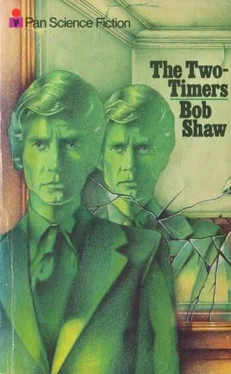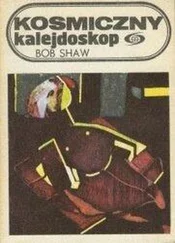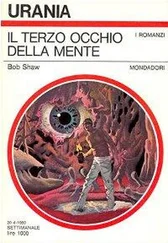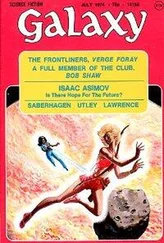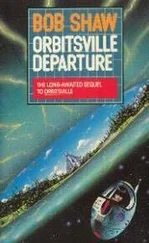Bob Shaw - The Two Timers
Здесь есть возможность читать онлайн «Bob Shaw - The Two Timers» весь текст электронной книги совершенно бесплатно (целиком полную версию без сокращений). В некоторых случаях можно слушать аудио, скачать через торрент в формате fb2 и присутствует краткое содержание. Год выпуска: 1971, Издательство: Pan SF, Жанр: Фантастика и фэнтези, на английском языке. Описание произведения, (предисловие) а так же отзывы посетителей доступны на портале библиотеки ЛибКат.
- Название:The Two Timers
- Автор:
- Издательство:Pan SF
- Жанр:
- Год:1971
- ISBN:нет данных
- Рейтинг книги:5 / 5. Голосов: 1
-
Избранное:Добавить в избранное
- Отзывы:
-
Ваша оценка:
- 100
- 1
- 2
- 3
- 4
- 5
The Two Timers: краткое содержание, описание и аннотация
Предлагаем к чтению аннотацию, описание, краткое содержание или предисловие (зависит от того, что написал сам автор книги «The Two Timers»). Если вы не нашли необходимую информацию о книге — напишите в комментариях, мы постараемся отыскать её.
THE TWO-TIMERS is his third novel, but the first to achieve maior publication.
The Two Timers — читать онлайн бесплатно полную книгу (весь текст) целиком
Ниже представлен текст книги, разбитый по страницам. Система сохранения места последней прочитанной страницы, позволяет с удобством читать онлайн бесплатно книгу «The Two Timers», без необходимости каждый раз заново искать на чём Вы остановились. Поставьте закладку, и сможете в любой момент перейти на страницу, на которой закончили чтение.
Интервал:
Закладка:
Again, he had closed a mental file, satisfied at having reached a firm conclusion one way or the other, and the pattern of thinking that was to make him a very special kind of policeman was already sharpening into focus.
He had gone into the force almost automatically, but — in spite of excellent academic qualifications — had not made his expected progress through the ranks. A good police executive learns to live with the statistics of his profession. He accepts the fact that while some crimes are solvable, most are not, and channels his energies accordingly; optimizing gains, cutting losses.
But Blaize Convery was known in the force as a “sticker” — a man who was constitutionally incapable of letting go a problem once he had got his teeth into it. His seniors and fellow detectives respected his personal record of successes, but it was a standing joke in the area that the chief of the records bureau had resorted to making secret raids on Convery’s desk to get back sizable sections of his filing system.
Convery understood his own idiosyncrasies, and knew how they were affecting his career. He frequently resolved to alter his approach to the job, often managing to conform for weeks on end, but just as it was beginning to look as though he had won, his subconscious would throw up a new slant on a three-year-old investigation, and an icy, egotistical joy would start churning his stomach. This moment, Convery knew, was the crunch: his own private version of the experience which made other men great religious leaders, immortal artists, or short-lived combat heroes. He had never resisted its mystical blandishments, and had never been disappointed in the rewards, or lack of them.
And as he drove away from the Breton house, through tree-guarded avenues, Convery could feel that arctic elation stalking the pathways of his nervous system.
He guided his elderly but well-maintained Plymouth past green lawns, reviewing the Breton-Spiedel affair, reaching nine years into the receding past. The case was unique in his memory, not for the fact that he had failed to crack it — there had been many failures in his career — but because he had been so monumentally wrong. Convery had been in the station when Kate Breton was brought in, and he had got most of the story from her in those first stunned minutes while a policewoman was washing flecks of human brain tissue from her hair.
Compressed to its essentials, her story was that she and her husband had fought on the way to a party. She bad gone on alone on foot, foolishly taking a shortcut through the park, and had been attacked. A man had appeared from nowhere, put a bullet though the attacker’s head, and vanished again into the night. Kate Breton had run blindly until she was on the point of collapse.
Working on those bare facts, Convery had reached two possible explanations. He had begun by immediately dismissing the idea that it had all happened by chance, that a mysterious stranger had just happened to be walking in the park at the right moment, carrying a high-powered rifle. This left the possibility that the marksman was someone who knew the attacker and suspected him of being a psychotic killer, who had trailed him until he had positive proof, and then carried out a summary execution. It was a theory which Convery had rejected instinctively, although he would check it out as a matter of course.
He had found his mind drawn into a vortex centered on Kate Breton’s husband. Suppose the car breakdown and the subsequent fight had been planned? Suppose Kate Breton’s husband had wanted to get rid of her and had brought a gun in the trunk of his car? He could have followed her to the park, been about to shoot when the attack occurred, and on the spur of the moment fired at the attacker.
The second theory had holes in it, but Convery was experienced at plugging holes. He had begun by asking Kate Breton if she had any idea who did the shooting. Still in a state of shock, she had shaken her head — but Convery had seen the curve of her lower lip deepen as she subvocalized a word, a name beginning with J.
And when he had gone to the Breton house, armed with the description provided by the teenagers who had seen the shooting… And when he had read the guilt in Breton’s eyes, he had known that here was his killer…
The discovery that Breton could not be touched had wounded Convery in some obscure way he could hardly understand. He had spent weeks trying to shake the alibi given to Breton by the neighbors who had noticed him standing at his front window; and he had made himself unpopular with the forensic staff by insisting they could have been wrong about the rifle not being fired. Convery had even experimented with an old deer rifle — firing it, cleaning it with various solutions and spraying it with dust. But in the end he had acknowledged that Breton, the man who had charged the very air with his guilt, could not be touched.
For any other cop, that would have been the time to close the file and move on to something more promising — but Convery’s demon was perched firmly on his shoulder, whispering its heady promises of fulfillment. And as he drove homewards he could hear its voice suddenly grown strong again. There had been times during the past nine years when his visits to the Breton house had seemed utterly pointless, acts of monomania, but today he had smelled the fear and the guilt…
Convery swung the Plymouth onto the short concrete walk outside his own house, narrowly missing a tricycle belonging to his youngest son. He got out of the car and as he was closing the door detected a faint squeak from one of the hinges. After swinging the door several more times to satisfy himself about the location of the tiny sound, he went into the garage, brought out an oilcan and lubricated the hinges on all four doors. He put the can back in its own appointed place then went through the inner door, through the utilities room, and into the kitchen.
“You’re late, darling.” His wife, Gina, was standing at a table which was covered with baking requisites. Her forearms were streaked with flour and the warm air of the kitchen was filled with the nostalgic odor of mince pies.
“Sorry,” Convery said. “I got held back.” He patted his wife on the rump, absentmindedly lifted a piece of candied peel and began to nibble at it.
“Blaize?”
“What is it, honey?”
“Were you over at-the Breton house again?”
Convery stopped chewing. “What makes you ask?”
“Tim said you’d been into his fossil collection again. He said his ammonite was missing.”
“Hey!” Convery laughed. “I thought I was the detective in this house.”
“But were you there?”
“Well, I did stop by for a few minutes.”
“Oh, Blaize — what must those people think?” Gina Convery’s face showed her concern.
“Why should they think anything? It was just a friendly call.”
“People are never friendly with a detective who has investigated them in a murder case. Specially people with their sort of money.
“There’s no need to get all tensed up over it, honey — John Breton and I get along well together.”
“I can imagine,” Gina said as Convery went through into the lounge. He sat down, picked up a magazine and turned the pages unseeingly. Something very strange had happened in the Breton household nine years earlier, and today had been like a trip back through time to that focus of stress. As well as being thinner, Breton had looked older — yet, in an indefinable way, he had seemed younger, less experienced, less sure of himself, emitting a different aura. I’m going crazy, Convery thought. Auras aren’t evidence — not unless this telepathy thing that’s been in the news is really beginning to spread. He leafed through the magazine, picked up another, then threw it down in disgust.
Читать дальшеИнтервал:
Закладка:
Похожие книги на «The Two Timers»
Представляем Вашему вниманию похожие книги на «The Two Timers» списком для выбора. Мы отобрали схожую по названию и смыслу литературу в надежде предоставить читателям больше вариантов отыскать новые, интересные, ещё непрочитанные произведения.
Обсуждение, отзывы о книге «The Two Timers» и просто собственные мнения читателей. Оставьте ваши комментарии, напишите, что Вы думаете о произведении, его смысле или главных героях. Укажите что конкретно понравилось, а что нет, и почему Вы так считаете.
